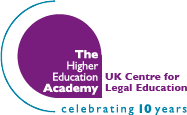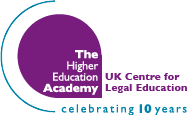What are the three main challenges facing legal education over the next ten years?
Share your views
Below are responses to the first question posed in the Visions of legal education session at the Learning in Law Annual Conference 2010 – see the Changes page for suggestions of how to meet these challenges.
Do you agree with the Learning in Law Annual Conference 2010 delegates? Email UKCLE on ukcle@warwick.ac.uk with ‘visions of legal education’ in the subject line and we will add your comments.
Scott Taylor:
- Promoting learning in law
- Making legal education affordable
- Promoting diversity in the legal profession and law teaching
Martha-Marie Kleinhans:
- A curriculum that is still targeting the legal profession whilst the latter is decreasing its size of intake
- As a very traditional discipline vis-a-vis teaching and learning styles and methods, it faces much greater challenge meeting the expectations of incoming students searching for an education beyond ‘sage on the stage’ and 100% exams
Avrom Sherr:
- Lack of funding
- Interference of the professions
- Digital environments
Susan Blake:
- Developing appropriate and effective use of IT
- Overcoming the fundamental and destructive problems caused by the academic/professional divide
- Preparing students for a massively changing legal profession
Becky Huxley-Binns:
- Loss of academic freedom in curriculum planning and delivery
- Aligning student expectations to what teachers want to teach (with or without good justification)
- Loss of funding – doing a great deal more with a great deal less
Imelda Maher:
- Ensuring positive synergies with the practitioner bodies
- Preserving and encouraging innovation
- Attracting motivated and inspirational staff and students
Anon:
- Decreased public spending on higher education
- Maintaining/increasing diversity of those students who become practising lawyers
- Use of technology
Kirsty Horsey:
- Increased student numbers
- Research – teaching divide (and a growing number of academics disengaged from teaching and learning)
- Growing instrumentalism of students
Fiona Cownie:
- Make teaching more exciting
- Retain and develop the concept of legal education as a liberal education
- Cope with less resources
Edward Stone:
- Preparing students for increasingly diverse legal workplaces
- Adapting teaching for students who are less and less used to absorbing detailed information from books
- Using e-learning to enable students to develop high level skills
John Stanford:
- Funding – finding methods of funding which do not limit access inappropriately
- Being seen as a vocational training course
- Students’ perceptions – difficulty of managing them before applications
Anon.
- Finance/resources
- Privatisation of HE
- Fully embracing IT
Anon:
- Financial pressures, combined with greater attempts at control by the professions and a need to take widening participation more seriously
John O’Dowd:
- Communicating with students in terms that are meaningful to them
Challenging students with ideas and values that are outside their experience
Enabling students to act on what they learn
Anon:
- Resources – government cut backs will re-shape the sector
- Rapidly changing technological expectations
- Rising and legitimate student expectations in relation to teaching quality
Karen Counsell:
- Government resources
- Student expectations
- Knowing what direction to go in
Richard Heald:
- Fee/funding pressure towards elitism
- Student/government/legal profession pressure towards a box-ticking approach to legal education
- Legal education being/becoming ‘training for hierarchy’
Dawn Watkins:
- Cuts in funding
- Responding to an increasingly ‘business-like’ approach to higher education – e.g. two year degrees – can we avoid them?
- Providing sustainable teaching methods in light of digital technology available
John Hodgson:
- Resources – mainly human and the ‘unit of resource’
- Harnessing technology
- Developing more creative/ inquiring rounded students
Marcus Soanes:
- Following through on the statements that commit institutions and the professions to widening participation
- Coping with the diversification of legal practice coming out of the Legal
- Services Act
- Adjusting to the new financial realities
Amanda Fancourt:
- Increased numbers, and changes in the professions and their needs – the academy could be better aware of the professions, and vice versa, without one dictating to the other
- Responding appropriately to changing learning needs of students
Caroline Coles
- Fees – economic climate – student debt
- Recognition of educational research as equally important
- Critical thinking – information literacy skills over strategic learning
Caroline Hunter:
- Decreased public spending on higher education
- Maintaining/increasing diversity of those students who become practising lawyers
- Use of technology
Helen James:
- Developing integrated programmes that meet the needs of future employers whilst maintaining the integrity of a liberal legal education
- Integrating/utilising technologies that will effectively contribute to the above
- Adapting to new economic and political climate within HE
Alison Bone:
- Diminishing unit resources
- The need to widen access
- Engaging students who have less time to study
Anon:
- Lack of resources
- Meeting the challenges of devolution
- Embedding education for sustainable development and global citizenship across the legal curriculum
Chris Ashford:
- Reduced resources
- (Even) greater pressure on HE in general to address the needs of employers/skills agenda
- A more technologically focused, process driven and commodatised legal profession with a greater role for paralegals
Richard Owen:
- Lack of resources
- Meeting the challenges of devolution
- Embedding education for sustainable development and global citizenship across the legal curriculum
Last Modified: 4 June 2010



Comments
There are no comments at this time